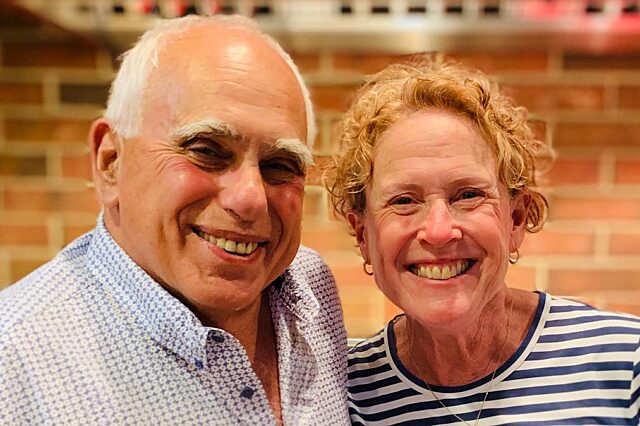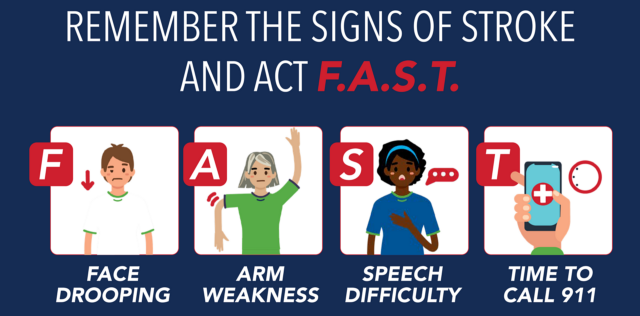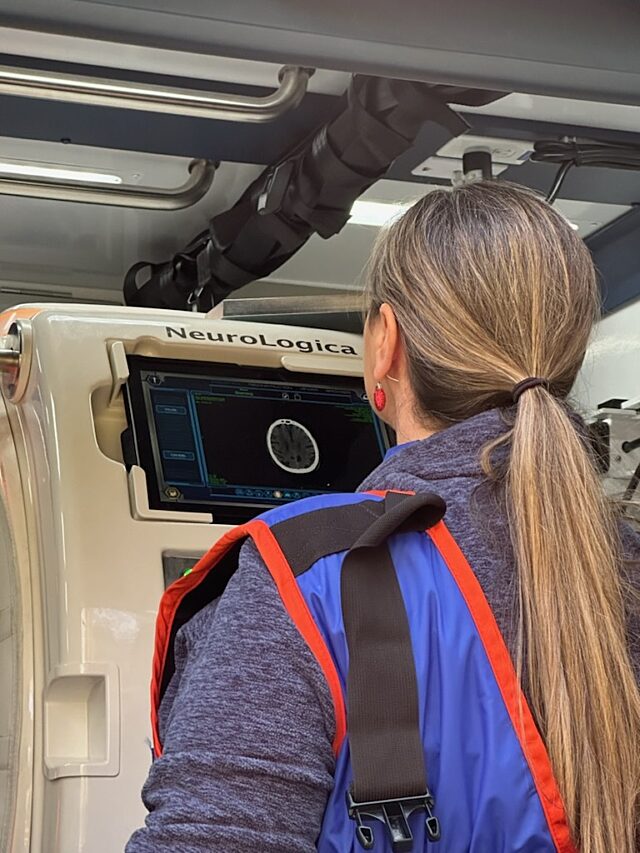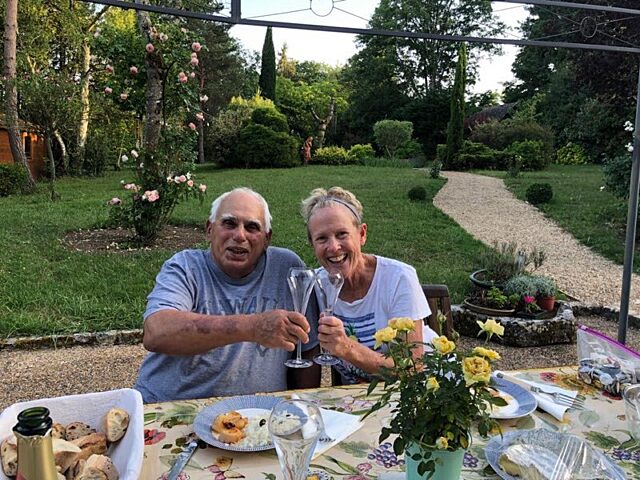Mobile Stroke Treatment Unit Comes to UF Health Surgeon’s Rescue

Emergency personnel arrived at Paul Dell’s home, where his wife led them upstairs. They found him sitting upright in a chair, unable to say his name, age or answer basic questions.
It spent a whole week sneaking up on Paul, picking random times to rob him of the ability to speak coherently. Now that the stroke had materialized in full force, it threatened to take much more from the 78-year-old than just his ability to speak. He needed treatment. And fast.
“It was such a quick onset,” said Ruthie, his wife. “The right side of his mouth was suddenly not upright. It was drooping, and that was the first sign that we saw.”
Subtle hints of the impending stroke started on Dec. 14. That day, Ruthie had picked up Paul from work when she noticed he “said some things that just didn’t make sense.” Two days later, he had trouble communicating with a patient.
Paul, an orthopaedic hand surgeon who has worked at UF Health for 46 years, attributed it to an especially tough work week, but the episodes continued. He had trouble putting words together during a phone call with a friend two days later, and then again after work a couple days after that.
Unknown to the couple then, those incidents were transient ischemic attacks, or TIAs. Also called ministrokes, TIAs are a brief blockage of blood flow that can cause temporary, stroke-like symptoms. TIAs differ from strokes in that they don’t damage brain cells or cause permanent disability. However, 1 in 3 people who have a TIA go on to have a stroke. That risk is especially high within 48 hours.
The morning of Dec. 21, when Ruthie saw Paul’s face drooping, she knew she was seeing one of the key signs of a stroke. Her mother had suffered one in 2016. She called for help, and with the MSTU embedded into the county’s 911 dispatch system, the unit was automatically notified and was first on the scene in 10 minutes.
Every minute matters when it comes to stroke. The American Heart Association estimates that every passing minute a stroke victim goes untreated translates to the loss of 1.9 million brain cells. Getting treatment within the first 60 minutes is vital, and that clock was ticking.
“Once we evaluated Dr. Dell in his home and found his vital signs and blood glucose to be normal, our priority shifted to assisting him downstairs to the MSTU and obtaining a CT scan of his head,” said Kelsey Prine, a registered nurse who was part of the stroke team.
To run that CT scan, Kelsey and the MSTU team didn’t need to rush to a hospital.
“As far as the beautiful gift of this mobile stroke unit goes, they did a CT scan of his brain in our driveway,” Ruthie said. “It blew my mind because he had a team of radiology people on board, and they did the scan of his head and neck, so they knew the plan.”
The on-site CT scan was key to his care, Paul said.
“That was the magic of the unit because they have a CT unit in the MSTU,” Paul said. "The scans provided valuable info as they became aware that one of my carotid arteries was entirely clogged up,” Paul said.
As the crew members conducted thorough assessments of Paul on scene, they worked in tandem with other local emergency medical services and physicians at UF Health, Teng Peng, MD, and Crystal Yu, MD. In the scans, Dr. Yu noticed an issue with Paul’s left cervical internal carotid artery. Then, Dr. Peng made calls to expedite getting Paul to the operating room at the UF Health Neuromedicine Hospital.
The MSTU crew was able to bypass the emergency department and bring Dr. Dell directly to the OR, where Brian Hoh, MD, was waiting for him. Dr. Hoh accessed the clot in Paul’s left carotid artery in the brain and neck through the femoral artery in his groin. Once he extracted the clot, he performed balloon angioplasty of his left internal carotid artery and then placed a carotid stent.
“When it comes to stroke, time really is brain,” Dr. Hoh said. “The combined data from large multicenter clinical trials have proven that the time spent to restore blood flow directly translates to the outcome for the patient. The incredible interdisciplinary stroke team at UF, with the addition of the new MSTU program, provides state-of-the-art, timely stroke care for our patients.”
Paul has noticed no limitations from the stroke that stalked him. He’s back to his normal life, which includes seeing patients and teaching fellows at UF Health.
“All my muscle groups are working normally. I don’t think I have any damage,” Paul said. “I’m doing great. Last week, I went back to my full duties at work and had no problem.”
Paul’s story has a happier ending than many.
Stroke is still a leading cause of death and long-term disability in the United States. Services like the UF Health Mobile Stroke Treatment Unit are rare, with fewer than 20 such programs operational around the country. Since its July 2023 launch, UF Health’s MSTU has shown the ability to save an average of 38 minutes in stroke response, which translates to 78 million saved brain cells.
“Having a standard rescue responding to Dr. Dell’s home would have delayed assessment by a vascular neurologist, delayed obtaining a CT/CTA until arrivals and assessment at the emergency department, and ultimately delayed the time getting him into the OR, where Dr. Hoh provided a lifesaving procedure to re-establish normal blood flow within Dr. Dell’s brain,” Kelsey said.
That’s why Ruthie is forever thankful for the MSTU crew she credits with saving her husband’s life: nurse Kelsey Prine, paramedic Elizabeth Pridgen, EMT James Riddling and CT tech Rebekah Webb.
“You know, Paulie has about 70 of his graduates that are hand surgeons all over the country, and they were shocked when we shared the story with them,” Ruthie said. “These doctors work all over the country, and there’s an assumption that these specialized stroke units are sort of everywhere. Well, they’re not. I think it was just really comforting and exciting for everyone to see that he was getting the best of care.”
About the author



